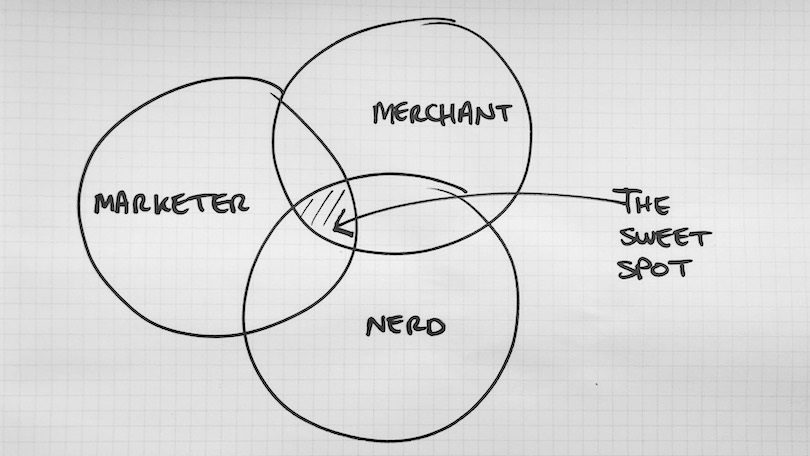What even IS e-commerce?

Around 10 years ago, I had a Saturn-returning moment and decided I wanted out of my e-commerce job at Coles Online. After spending almost seven years there, I’d completely lost perspective on what a good work-life balance looked like. It was time for a change.
Meeting with a recruiter to explain what I did was an enlightening sign of the times. We didn’t really call it e-commerce back then. Yes, I know people in some circles did, and certainly they did internationally, but for this particular recruiter (who now specialises in digital recruitment mind you), and this particular job, they just couldn’t wrap their heads around what I did.
Recruiter: “Okay, so you manage the website”
Me: “Yes”
Recruiter: “So you’re in IT”
Me: “No, I manage the content and product on the site to deliver against a sales and profit target”
Recruiter: “Okay, so you’re in marketing”
Me: “Not exactly. I work with marketing but I’m not in marketing”
Recruiter: “But you’re not in IT”
Me: “Correct”
Recruiter: “Okay… I’m still not entirely sure what you do”
While this example is over a decade old, I still encounter it in some form or another at every retailer I’ve worked with. The conversation is often with senior execs, who know they need to hire a head or a GM of e-commerce, but they have no idea who it is they need to hire.
Candidates often show up with shiny eyes and confident stories of marketing success or accomplished tech speak, and the hiring manager is impressed. But really, at the heart of any e-commerce leader is a merchant: someone who knows the numbers, who knows their store, who understands the customer and what drives a sale. Their technical and marketing acumen serve to supplement the skills of someone who is truly a retailer.
Merchant at heart
Someone who works in e-commerce is the digital equivalent of a store manager. When they walk into their store each day, they should have a good understanding of what they need to achieve as a sales target, and make sure that is understood by everyone working in that store.
They should know who their customers are, what they look like, what they like. The should talk to their customers, listen to their concerns. On a daily basis. They should know where in the store customers hang out, what categories and products are the highest converting, which up-sells work. At any time of the day they should able to look at their store and know what’s going on.
Sure, the tools are different. A store manager has the benefit of being physically present in making these observations. A head of e-commerce has analytics, customer service teams, feedback tools and forms, heat maps, and our favourite friend to decipher all of the above: Microsoft Excel. But essentially the rules are the same. A store manager knows her shit. E-commerce peeps: we need to know our shit too.
Marketing enthusiast
Where do all these people come from? They’re not just strolling past your store at Chadstone; you need to go find them. In one of my previous roles, we launched a web store on the mandate of “if you build it, they will come”. Trust me, they don’t just come.
A good e-commerce leader knows where customers are coming from and knows how and when to tailor the journey to them. They may not always be directly responsible for bringing customers in, but they’re certainly accountable for emptying their pockets once they arrive. And you can’t do that without having a pretty good understanding of the wonderful digital ecosystem that is digital marketing.
Major nerd
OK, you don’t need to be a flat out massive nerd to be in e-commerce, but it sure helps. I’ve always worked on the assumption that the more you understand about the technology you’re using, the more capably you’re going to be able to deliver on your objectives. Investing time and energy in growing your own knowledge set will go a long way in building a shared language with your development team, which makes it much easier to collaborate on simpler and more robust solutions to the problems you’re trying to solve.
Plus, it’s a very happy moment when you can apply your knowledge of CSS to help understand why a page appears broken, look at some source code to find what might be wrong with your meta data, or apply a little custom JavaScript in GTM to set up some insightful event tracking.
The perfect e-commerce leader is someone who sits in the creamy middle of the Venn diagram. Yes, I love a Venn diagram, and I’m a massive nerd. You got a problem with that?
Louisa Simpson has been an e-commerce leader for almost 15 years, running online stores for many of Australia’s biggest brands including Coles, Bonds and Mecca Brands.
She now works as a consultant, helping retailers grow their online capability by supporting business with e-commerce strategy, organisational structure design, conversion rate optimisation, platform migration and analytics.
Get in touch at contact@lousimpson.com.au or visit lousimpson.com.au.
Comment Manually
You must be logged in to post a comment.

No comments